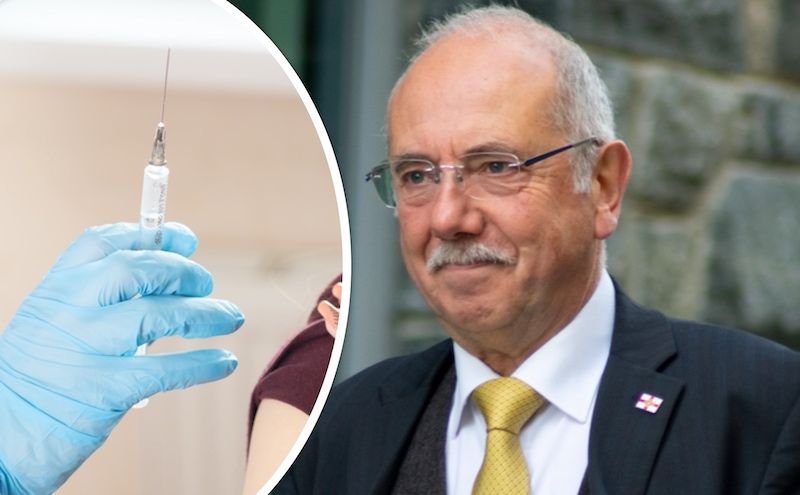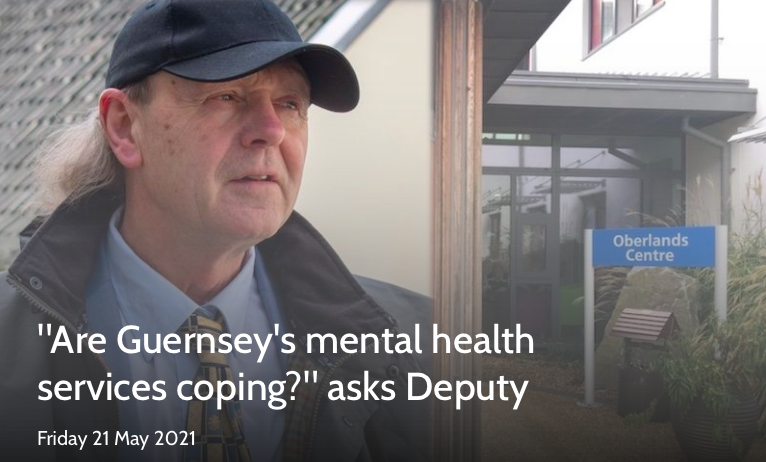


While vaccination is recommended, individual discretion is respected, HSC's President has said in response to a deputy's concerns about "discrimination and alienation" of those who refuse a jab.
Deputy Lester Queripel submitted numerous questions to Deputy Al Brouard about the vaccination process, the reporting of any side effects, 'alternative' treatments, and his belief that there may be discrimination based on vaccination status.
The Rule 14 questions - which can be read in full HERE - ask what approach will be taken by HSC for those decide against vaccination, or cannot have it for medical reasons.
"How will islanders who choose not to be vaccinated be treated by HSC in the future, without fear of venturing into the realms of discrimination and alienation?" Deputy Queripel asked.
Deputy Brouard replied that all services provided by Health and Social Care "operate on the basis of informed choice."
"As is the case with other vaccination programmes in the Bailiwick, such as the seasonal influenza and childhood immunisation programmes, the Covid-19 vaccination programme operates on a voluntary basis and while vaccination is recommended, individual choice is respected.
"There are also a small number of individuals for whom vaccination is not recommended, for example those with an allergy to any of the vaccine components."

Pictured: Under current Emergency Powers regulations made by the Civil Contingencies Authority, the maximum amount of damages that could be awarded in the event of any personal injury or death suffered from a Covid-19 vaccine is £120,000.
It has recently been announced that a vaccination passport is in the final stages of its design. It is understood that this will tie into the Travel Tracker Programme and align in some detail to what the UK is working on.
"No policy approach has been devised by Health and Social Care, because the uptake of Covid-19 vaccines is voluntary," Deputy Brouard added. "Broader considerations around the development of, for example, Covid passports sit outside the Committee and would be considered by the Civil Contingencies Authority."
Asked about a variety of 'alternative' treatments used elsewhere, Deputy Brouard said Public Health Services will continue to review their effectiveness, using "its well-established links with Public Health England and others to keep up to date with such developments."
Deputy Queripel went so far as to ask how confident HSC was that "the Covid-19 vaccine won't turn out to be the next Asbestosis (Diffuse Mesothelioma) or Thalidomide?"
"The safety and efficacy of the vaccines has and continues to be scrutinised and assessed by the Medicines and Healthcare products Regulatory Agency (MHRA), including any adverse reactions experienced by vaccine recipients," Deputy Brouard replied.
"In the Bailiwick, the vaccines have further been considered by the Medicines Committee, established under the Medicines (Human and Veterinary) (Bailiwick of Guernsey) Law, 2008, and the vaccine schedule recommendations of the Joint Committee on Vaccination and Immunisation (JCVI) are followed.
"Notwithstanding the fact that the administration of all medicines carries an element of risk, the Committee for Health & Social Care considers that given the significant and continual advances within medical science and the rigorous governance structure that permits the use of Covid-19 vaccines, it is not expected that the morbidity witnessed in individuals exposed to asbestos, a non-pharmaceutical product, or those prescribed thalidomide in the 1950s will be repeated."

Pictured: Deputy Lester Queripel has also posed question to HSC about mental health services in Guernsey. Those will be answered at this week's States meeting, commencing on Wednesday.
For anyone who does experience any side effects, there is a reporting system in place to flag up bad reactions and detect any concerning patterns.
"The MHRA’s Yellow Card Scheme is a longstanding independent reporting mechanism for drug side effects, defective or counterfeit medicines and incidences with medical devices, among other things," said Deputy Brouard.
"Health professionals in the Bailiwick use this system to report side effects as it is an established scheme that is used across Great Britain. It can also be used directly by patients. Severe reactions to any drug are also investigated through Health and Social Care’s risk reporting system, to establish potential learning for future practice."
He continued: "Public Health Services is satisfied that the Yellow Card reporting scheme described above provides an effective mechanism for recording the side-effects for Covid-19 vaccinations and for notifications of any such effects being reported to inform clinical practice.
"It is more robust than any system that could be established for the Bailiwick alone, due to the number of health authorities that provide data into the system. There is therefore no plan to implement such a scheme."
Pictured top: Health & Social Care President Al Brouard.
Comments
Comments on this story express the views of the commentator only, not Bailiwick Publishing. We are unable to guarantee the accuracy of any of those comments.